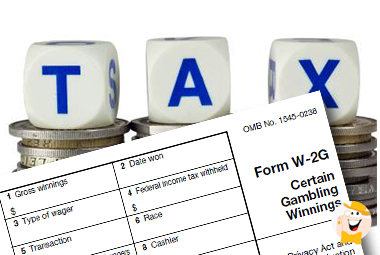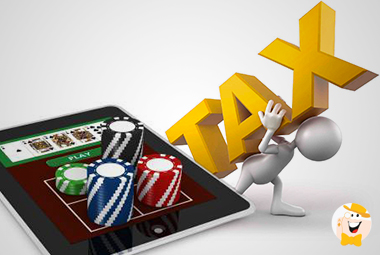
Should I Pay, and How?
In fairness, this is an editorial that is going to concern mostly players from the United States, however, we may come out with future editorials that deal with the tax implications of online gambling in other countries. For the time being, however, we are seeking to answer the question of whether or not gambling taxes should be paid as a result of online gambling in the United States, and if so, what are the procedures for doing so?
While we would not suggest that any online player should shirk his//her tax obligations, it is fair to say that the IRS will likely not be able to ascertain that a player has won money gambling online in the event that the player does not file taxes on the winnings. However, for individuals who are playing in a state (such as New Jersey) in which the online gambling activities are licensed and regulated by the state, then the standard rules dealing with W2-G forms will apply.
The first thing that we are going to look at is the implications of a W2-G taxable jackpot for those playing in a state licensed and regulated environment, and then we will look at the tax implications for those who are not playing in such an environment.
W2-G Forms:
W2-G forms are forms that are issued by the casino that a player must fill out in order to be paid on certain winnings, which include:
- Winnings of $600 or more on games in which the win is $600 or more AND the win is also in excess of 300 times the amount wagered. An example of such a win would be a Progressive on a side bet for something like Let It Ride, another example may be hitting a six-point Fire Bet at the Craps table. The threshold is greater ($1,200) for slot machine and Bingo winnings, and such winnings also include electronic table games as well as online games.
- Winnings of $1,200 (or more) on slot machine, bingo, video poker, video keno, electronic table and virtually any other electronic table game. By definition, any online gambling winnings in excess of $1,200 would fall under this category. With respect to these winnings, the amount wagered does not matter, which is why someone playing Video Poker at a $100 denomination ($500 bets) will have a W2-G for any three-of-a-kind or better on the majority of Jacks or Better variants. When someone is playing these kind of denominations, however, there will usually be an employee of the casino maintaining a log of such hits so that everything can be taken care of at the end of the session.
- $1,500 (or more) after accounting for the amount of the wager in Keno and some other games. This would apply to live keno, however, with electronic keno or video keno being subject to the slot machine winning threshold of $1,200 irrespective of the amount of the wager.
In the case of online gambling, the only one of these three W2-G forms that would be applicable is the $1,200 win as everything would constitute an electronic game, or to use the parlance of the tax code, they would all be considered, ‘Slots.’

Tax Implications of W2-G’s:
Technically, a player is supposed to file taxes on all gambling winnings, not just those that led to the issuance of a W2-G. However, as a practical matter, that rarely happens for players who do not receive a W2-G form at some point. For those players who do fill out a W2-G form, filing the win (at least the win for which the W2-G was issued) is imperative because it is a form that the casino itself also provides to the Government. In essence, it is considered income.
When a player receives a W2-G form from the casino and fills it out, that player still has the option to take deductions for losses against gambling winnings. With respect to these losses, however, they cannot exceed the amount of the money won and being claimed on the W2-G. In other words, if you have lost money overall gambling on the year, the deductions only count up to the amount won and any other losses in excess of the amount won have no tax implications whatsoever. Furthermore, any gambling losses cannot be carried forward (as with business losses) to offset any gambling gains in future years for someone who gambles as a hobby.
Secondly, any gambling losses can count as a deduction against the, ‘Income,’ generated by gambling wins, however, any such deductions are lumped in with an individual’s other tax deductions, whatever those may be. In that sense, it is possible that an individual will incur a gambling win, use gambling losses to offset the amount of the gambling win, but will pay more taxes due to the gambling win anyway. This happens when an individual’s, ‘Standard Deduction,’ exceeds the amount being claimed in gambling losses in addition to all other deductions.
The short story is that if you do not want to have to deal with either gambling wins or gambling losses on your tax forms, then you should endeavor not to garner a win that would call for a W2-G to be issued. That can be difficult for players of certain games, such as slot machines, in which very small bets can result in the player theoretically incurring a hit that would be, ‘Taxable.’ However, players who play Video Poker at the quarter level, single-line, or at a lower level would not have to worry about it. Players who play at the dime level could play a two-handed game and players who play at the nickel level could play a five-handed standard Video Poker game and not have to worry about triggering a W2-G.
For those who enjoy playing Video Poker variants, however, it is important to consider that one could theoretically incur taxes if the maximum payout possible on the game (or any payouts less than the maximum) can theoretically result in a hit of $1,200, or more. Ultimate X, Super Times Pay and Hot Roll Poker are just a few examples of games in which one can be playing five or fewer hands at a time at the nickel level and incur a win that would result in a hit of greater than $1,200.
Video Keno is also a, ‘Safe,’ game to play for an individual whose primary goal is to avoid the issuance of a W2-G because the maximum possible payout for most (if not all) Video Keno games is evident by the paytable and whatever features that the game may have. Furthermore, there are some slot machines (particularly those that do not include any kind of Free Games feature) in which the maximum possible hit is such that one can play without worrying about generating a W2-G form. In fact, certain single line quarter-denomination machines of old were specifically designed so that the maximum possible payout would be $1,199, in order to avoid the tax forms.
With respect to W2-G forms, it is important to understand that one can essentially not get around claiming at least that win when one of these forms has been issued. While that win can be offset with losses, any losses in excess of any claimed wins do not have any tax implications whatsoever. Finally, there still may be some individuals for whom circumstances are such that they will take the standard deduction, because it would be greater than the sum of the person’s other deductions, even after attempting to write off the gambling win. For individuals for whom such may be the case, unless they are playing at an advantage, they would be well-advised to stick only to games that would not result in a W2-G form because there is no upside to them gambling.

The reason that this is true for an individual whose gambling wins (and deductions for losses equal to those) plus other deductions do not exceed the standard deduction is because only three things can happen when a person gambles:
- The person wins.
- The person loses.
- The person breaks even.
When an individual wins and has to pay taxes on the winnings, then effectively, they have not won as much as they think they have. If the standard deduction come tax time is greater than the total deductions that the player would otherwise take, (including writing off the entire amount of the win by way of losses) then the result is that there is no way to get out of paying taxes on the gambling winnings even if the individual, in fact, has actually lost. In a sense, a person so situated would not be wrong to look at the gambling taxes as being an effective increase to the house edge because the money paid to taxes is not recoverable whether or not the person wins or loses overall for the year.
If the person loses overall for the year without hitting something causing a W2-G form, then the person just loses and nothing can be written off, anyway. Technically, that’s not exactly true, but we’ll address that a little later.
If the person breaks even without hitting something calling for a W2-G, then the person just broke even and that’s the end of it.
While we would not encourage anyone to duck their tax obligations, what we can say is that itr can only be detrimental (including the detriment of playing a negative expectation game in the first place) for an individual to hit a W2-G pay when the standard deduction will be greater than the sum of the person’s total deductions including deductions for the gambling win. The reason why is that the person now has a greater amount of taxable income than he or she otherwise would have, and effectively, has no way to write-off the increase to his/her income.
Misconceptions and Tax Law:
Perhaps the most prevalent misconception that players have with respect to paying taxes on gambling winnings is the notion that players are only required to pay taxes on winnings that have resulted in a W2-G form. In actuality, a player is expected to pay taxes on ALL gambling winnings, regardless of whether or not the winnings in question triggered a W2-G form.
Once again, while we would certainly not advise anyone to duck their tax obligations, as a practical matter, this doesn’t happen very often. Generally speaking, gamblers will lose money overall over the course of a year, at least, people who are playing at a disadvantage and gamble with any real frequency. Furthermore, players generally do not keep a log of their sessions and file taxes accordingly, especially players who have not triggered a W2-G that year.
Keeping Records:
For any players out there who wish to abide strictly by the letter of the law, those players would be encouraged to keep records of all of their gambling activities for tax purposes. These activities would include any wins they may incur as well as any losses that would serve to offset those wins as a deduction. These records, of course, could become necessary if a player is audited and claims losses to offset gambling wins. However, if a person claims gambling wins but does not offset for losses, even under an audit, it is unlikely that such records would be necessary.
Proper record keeping would include the following, at a minimum:
- The date and time of the gambling activity, and/or session. The player might even choose to include the game, or games, that were played during the session.
- The name and address of the location at which each session took place.
- The amount either won or lost during each individual session.
For those who wish to keep such records in order to ensure that they are strictly abiding by the letter of the law, this is the absolute minimum record keeping that we would encourage. We might also encourage players to keep such records just for their own personal reflection, anyway, as such record-keeping might put into perspective how much time and/or money a person spends on gambling within a given year.
Online Gambling Not Regulated by a Particular State:
Some people may wonder how any of this could apply to online gambling that is not regulated within a particular state, and the answer to that is pretty simple: Strictly speaking, all gambling winnings are supposed to have taxes paid on them after they have been offset by gambling losses. When it comes to the letter of the law, there are no exceptions.
When it comes to the legality of online gambling within a particular state, whereas online gambling is generally legal for mere players in most states, there are some states in which it is illegal for mere players, but that doesn’t matter to the IRS. The IRS even has various mechanisms by which income from patently illegal activities is supposed to be reported, though the individual does not necessarily need to state what those activities were.

The record keeping would be the same as what has been indicated above, except the name and address of the location at which the gambling took place might simply be replaced by the name of the website at which the online gambling occurred. The IRS, for its part, does not care at all about the legality of the gambling that you did online, what they care about is whether or not a person is paying their taxes on the gambling winnings.
Finally, I would also suggest that an individual should only claim taxes (for the tax year) on monies that were actually received as a result of online gambling wins. To wit, if you have won gambling online and the casino has not yet paid you, then it could reasonably be argued that such winnings have not become income as of yet. With respect to deducting losses from gambling winnings, the procedure for doing so would be the same as though one were issued a W2-G.
In any case, the bottom line is that the IRS is not at all concerned with where the income derived as a result of gambling came from, or whether or not there is a W2-G attached to it. In order to abide by the strictest letter of the law, if an individual incurs gambling winnings over the course of a tax year, then the IRS expects taxes to be paid as a result of those gambling wins.
...But, As A Practical Matter:
Once again, we would never encourage anyone to avoid their tax obligations by not paying tax on gambling winnings, but for those players who are not issued a W2-G for anything, the IRS really has no way of knowing whether you won or lost at gambling, and to wit, whether or not you even gambled at all over the course of a year.

In the case of online gambling that is not specifically licensed and regulated by a given state, the IRS will effectively have no idea that you gambled online unless you decide to tell them. Casinos that are based overseas and operate online do not send any forms whatsoever to the IRS regarding the play and win/loss of an individual player simply because they are not required to do so. They do not pay any taxes to the IRS whatsoever because they are not a U.S. based company and they are not regulated in any way by an individual state or the Federal Government. For those reasons, the online casino at which you decide to play will not report your winnings to the IRS, and that being the case, the IRS has no way of knowing about it.
In that sense, online gambling is not any different than gambling without being issued a W2-G form in the sense that a recreational gambler is not monitored by the IRS and the IRS essentially relies on self-reporting of any gambling winnings. If there are no taxes that have been sent to the IRS from the location at which you did the gambling, then there is no tracking mechanism in place that would indicate that you have filed your taxes incorrectly, or that you have even gambled at all.
With all of that said, there is absolutely no advantage whatsoever to tracking your gambling results hoping to file for a deduction at the end of the year on losses. Once again, gambling only constitutes income in the event that a player wins, but a player could literally lose every single dime that he makes gambling and it would not impact his tax obligations in any way whatsoever. While that may seem fundamentally unfair, one might speculate that the reason for that is to prevent a player from claiming losses to gambling that do not actually exist simply so that the player can pay less in taxes.
Conclusion:
The bottom line of the entire thing is that players who gamble online are subject to exactly the same tax obligations and self-reporting requirements as players within the United States who gamble at a physical venue, or at a licensed and regulated online website operated within a state that has legalized same. In the end, players are required to report any gambling winnings that they may enjoy over the course of a year, and those winnings can be offset with their gambling losses by way of a deduction. However, the deduction for gambling losses will not have any tax ramifications once it has reached the amount of money that has been won gambling.

For the vast majority of recreational players, the only time that filing taxes on gambling winnings becomes an issue is in the event that the player is issued a W2-G form. In addition to the fact that the vast majority of recreational players are going to lose money overall, it would be impossible for the IRS to track and prove that a player did win money overall for the year, or quite frankly, gambled at all, in the absence of a W2-G form.
However, we do encourage players to keep track of their wins/losses and sessions over the course of the year whether they intend to file taxes or not, for the following reasons:
- In the event that you do visit a live casino, or play at one of the state-regulated websites in those states in which such are licensed and regulated, and get a W2-G, you will already have the records necessary to offset losses, if applicable.
- Keeping such records for the year helps keep things in perspective as to how much time and money you may be spending gambling.
If you have any questions, please send me a private message or comment in the comment section, as always, thanks for reading!










rferry5 7 years ago
7 years ago
Glad I dont live in nj and even if i did i never win anyways along with thousands of other gamers of course.. wish pa would legalize it then i can claim lots of losses from playing online and maybe it would give me a better tax refund besides still owe the irs hate them thansk rose
Please enter your comment.
Your comment is added.
Bgdubs 7 years ago
7 years ago
this is all very interesting stuff. thank you for taking the time to write all this out, as it is often confusing what to do in terms of winnings, taxes, and the like... seems like online gambling in this sense is a double edged sword in so much as us banks are not technically allowed to process transactions that are for...
this is all very interesting stuff. thank you for taking the time to write all this out, as it is often confusing what to do in terms of winnings, taxes, and the like... seems like online gambling in this sense is a double edged sword in so much as us banks are not technically allowed to process transactions that are for gambling....
Show morePlease enter your comment.
Your comment is added.